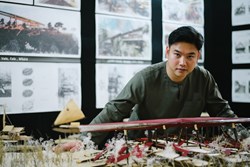Deidre Brown is an innovative and brilliant scholar in Māori architecture and arts. She is a fine writer, inspiring teacher and academic leader, and a warm and generous mentor and colleague. Her work has been ground-breaking for architects and scholars in Aotearoa New Zealand and internationally. It is wonderful to see her contributions recognised with the 2023 Gold Medal.
I first met Deidre in 2004, when her book Tai Tokerau Whakairo Rākau: Northland Māori Wood Carving won a prize for the best first non-fiction work in the Montana literary awards. She had just joined the National Institute of Creative Arts and Industries at the University of Auckland, where she quickly became involved in mentoring Māori and Pasifika architecture students, winning awards for this work.
My husband Jeremy and I got to know Deidre while she was writing her classic book Māori Architecture, which traced the evolution of Māori design from ancestral times through to the present. Our daughter Amiria became inspired by her ideas when Amiria and Rosanna Raymond were organising Pasifika Styles, a major exhibition featuring Māori and Pacific artists at the University of Cambridge.
Deidre’s work on Māori digital cultures became a key influence on the Artefacts of Encounter research project (2009-2011), co-directed by Amiria and Professor Nicholas Thomas at Cambridge. Deidre co-wrote the award-winning Art in Oceania: A New History (2014) with Thomas; won fellowships to Corpus Christi and Wolfson Colleges; and contributed to the two-volume work Pacific Presences that arose from this project.
As part of her research into travelling taonga, Deidre became fascinated by exchanges between her ancestor Te Pahi and Governor Philip Gidley King in New South Wales in 1805-1806, including a prefabricated house and a medal presented by King to Te Pahi. When Te Pahi’s medal came up for auction at Sotheby’s in Sydney in 2014, Deidre persuaded Te Papa Tongarewa and Auckland Museum to put in a joint bid that succeeded, allowing this ancestral taonga to be repatriated to New Zealand.
Later, in an episode of Artefact, a documentary series for Whakaata Māori Television, we explored our shared interest in the tragic story of Te Pahi, shot in mistaken revenge for the attack of the Boyd, and the extraordinary saga of his medal.
Deidre is a great person to work with, and a relational thinker in every sense – as mentor, teacher, writer, architect and academic leader. She often speaks of her ancestor Te Pahi; her great-grandfather Hāpeta Rēnata, one of the first Ratana āpotoro; her grandmother, a fluent Māori speaker and kapa haka exponent from Northland who lived in Gisborne; and her mother, who lived in West Auckland but stayed closely in touch with the whānau from Tai Tokerau. Each of them, and her English father, have had powerful impacts on her work, which explores the intertwined spirals of whakapapa, space and time as driving forces in architectural design.
Much of Deidre’s research and writing has been collaborative. It is globally expansive, meticulous and experimental, philosophical and vivid. As Head of the School of Architecture and Planning, Deputy Dean of the Faculty of Creative Arts and Industries, and member of many governance boards, she has advanced the profile of Māori architecture and arts while reaching out to the wider community. Her latest project, the Māori and Pacific Housing Research Centre MĀPIHI, a collective that aims to deliver healthy, sustainable, well-designed homes for whānau, weaves these strands of her work together.
Deidre Brown’s profound, original work has won her respect and admiration at home and abroad, and has enriched architecture and the arts in Aotearoa. She is a fine scholar and path-finding leader whose legacies embellish the Gold Medal award.
E te hoa, e te mareikura, ka nui āku mihi atu ki a koe mō ēnei mahi whakahirahira.
Dame Anne Salmond, ONZ FNAS FBA FRSNZ FAHNZ, is a Distinguished Professor of Māori Studies at the University of Auckland Waipapa Taumata Rau. Her late husband, architect Jeremy Salmond, was awarded a Gold Medal by Te Kāhui Whaihanga in 2018.



